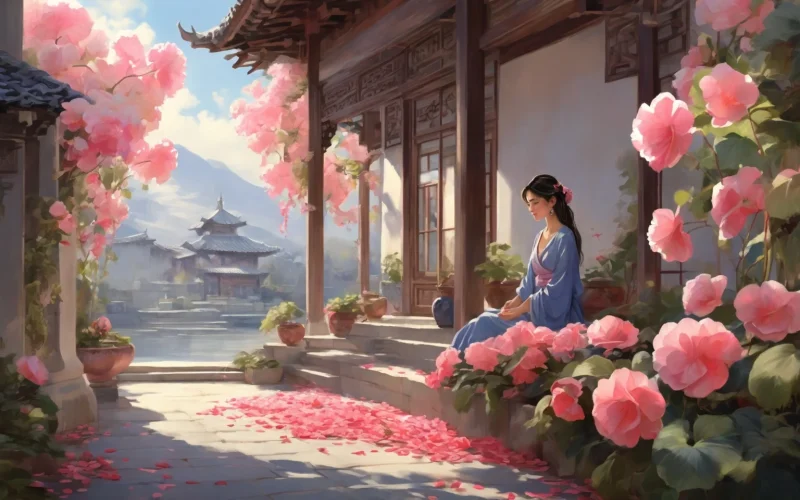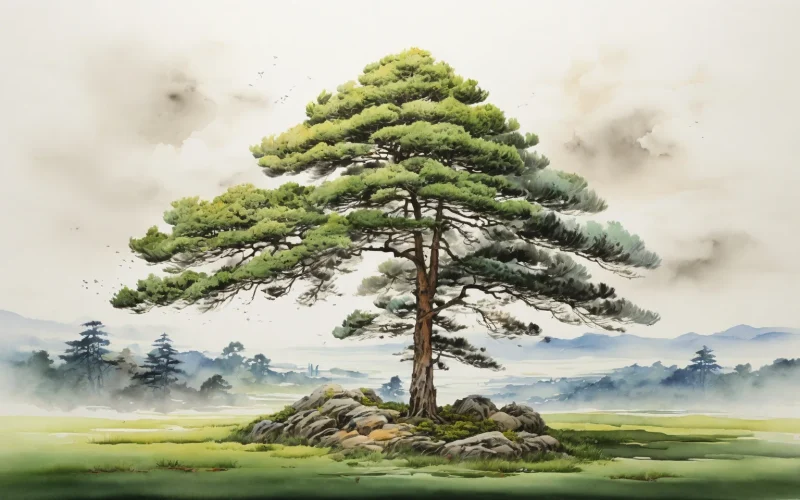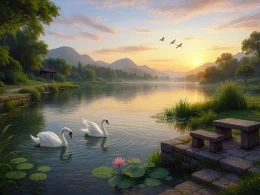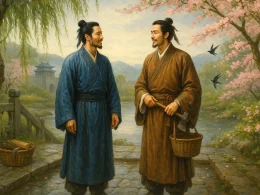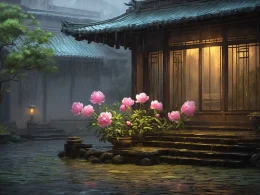The vernal breeze has brightened your color so fine;
You stir my mind to write a verse before good wine.
With rain impearled on you, more beautiful you grow;
You're all the more bewitching when about to blow.
The fair forgets to powder her face before you;
The painter hesitates to draw your picture new.
Nor verse nor wine's enough to show delight in me;
I envy butterflies perching deep in your tree.
Original Poem
「海棠」
郑谷
春风用意匀颜色,销得携觞与赋诗。
秾丽最宜新著雨,娇娆全在欲开时。
莫愁粉黛临窗懒,梁广丹青点笔迟。
朝醉暮吟看不足,羡他蝴蝶宿深枝。
Interpretation
This poem was composed during the Tang Dynasty by the poet Zheng Gu, who takes the crabapple flower as his subject. Through depicting the flower's graceful form and its scenic beauty, he expresses profound appreciation for nature's splendor while using the object to convey his emotions, embodying his pursuit of art, life, and unrestrained feeling. Amid the spring breeze and fresh rain, the poet becomes intoxicated by the delicate charm of the crabapple, employing exquisite brushstrokes to intertwine natural beauty with inner sentiment. The entire poem exudes refined elegance, vivid imagery, and lingering emotion.
First Couplet: "春风用意匀颜色,销得携觞与赋诗。"
Chūn fēng yòng yì yún yán sè, xiāo dé xié shāng yǔ fù shī.
The spring breeze carefully blends the flower’s hues,
Compelling me to bring wine and compose verse anew.
The opening personifies the spring breeze as an artist with "careful intent," as though it were deliberately painting the crabapple’s delicate colors. Enchanted by this beauty, the poet’s emotions unfurl, and poetic inspiration arises. This couplet blends scene and feeling seamlessly.
Second Couplet: "秾丽最宜新著雨,娇娆全在欲开时。"
Nóng lì zuì yí xīn zhuó yǔ, jiāo ráo quán zài yù kāi shí.
Its lush brilliance shines brightest when newly kissed by rain,
Its enchanting allure peaks just before it blooms.
Here, the crabapple’s beauty crystallizes in two moments: "newly kissed by rain" and "just before blooming." The rain enhances its vivid colors, while the half-open bud embodies restrained elegance—reflecting the poet’s unique admiration for subtle, transient beauty.
Third Couplet: "莫愁粉黛临窗懒,梁广丹青点笔迟。"
Mò chóu fěn dài lín chuāng lǎn, Liáng Guǎng dān qīng diǎn bǐ chí.
Fret not that the fair one by the window neglects her makeup—
Even Liang Guang, master painter, hesitates to capture this sight.
Through personification, the poet compares the crabapple to a beauty too languid to adorn herself by the window, while invoking the ancient painter Liang Guang to illustrate how such beauty defies replication. This conveys reverence for the flower’s uniqueness and hints at beauty’s elusive, unpossessable nature.
Fourth Couplet: "朝醉暮吟看不足,羡他蝴蝶宿深枝。"
Zhāo zuì mù yín kàn bù zú, xiàn tā hú dié sù shēn zhī.
At dawn I’m drunk on its sight; by dusk, my verses still fall short—
How I envy the butterfly that nests deep in its boughs!
The closing couplet shifts from admiration to longing for freedom. Though the poet can revel in the flower’s beauty and compose poetry, he remains an observer—unable to truly merge with it. Thus, he envies the carefree butterfly, expressing a wistful yearning tinged with quiet regret.
Holistic Appreciation
This poem depicts the splendor of blooming crabapple flowers in spring, yet transcends mere description through rich imagery, personification, and analogy—imbuing the blossoms with the poet’s aesthetic ideals, artistic philosophy, and emotional resonance. Vivid portrayals of spring breezes and drizzles interweave with admiration for their "delicate unopened charm," culminating in the artist’s awe before sublime beauty. The envious gaze toward butterflies in the final couplet lends the poem fluid emotion and philosophical depth, transforming it from nature poetry into a meditation on freedom and beauty.
Artistic Merits
- Precision and Euphony: With meticulous parallelism and refined diction, the poem’s gentle rhythm mirrors the crabapple’s elegance, creating classical harmony.
- Emotion Woven into Scenery: The flowers are not passive objects but vessels for the poet’s introspection—spring winds, fine rain, and butterflies become conduits for contemplating beauty and artistic creation.
- Allusions with Natural Depth: References to "Mo Chou" and "Liang Guang" elevate the poem from floral praise to humanistic reflection, expressing art’s inimitability.
Insights
True beauty lies not in grandeur but in fleeting moments—a dewdrop, a petal, a spring shower. The poem teaches us to cherish subtle, ephemeral beauty while yearning for life’s unfettered vitality. Its understated yet sincere emotion reminds us to pause amid chaos, attuning to nature and inner stillness—where poetic living begins.
Poem translator
Xu Yuanchong (许渊冲)
About the Poet
Zheng Gu (郑谷, c. 851–910), a native of Yichun, Jiangxi, was a Late Tang poet who earned the jinshi degree in 887. His style blended Wei Zhuang’s lyrical grace and Du Xunhe’s accessibility, bridging Late Tang and early Song poetry while influencing the Xianglian erotic tradition of the Five Dynasties.






